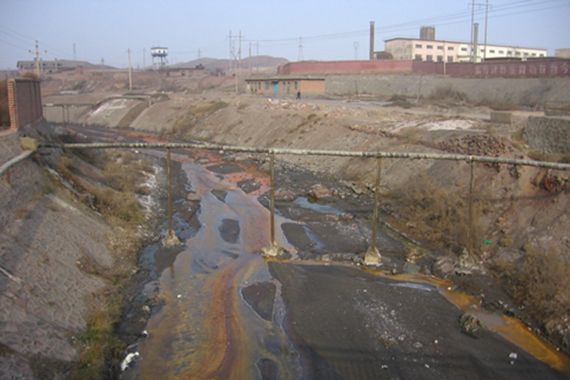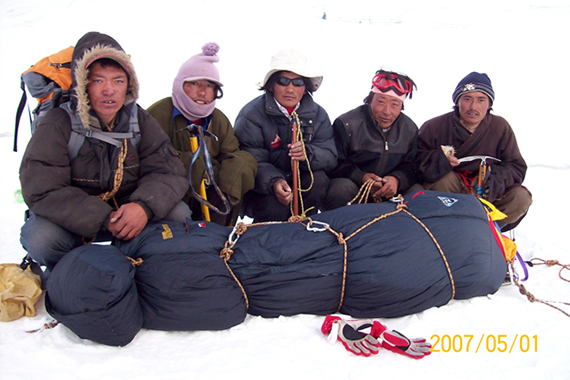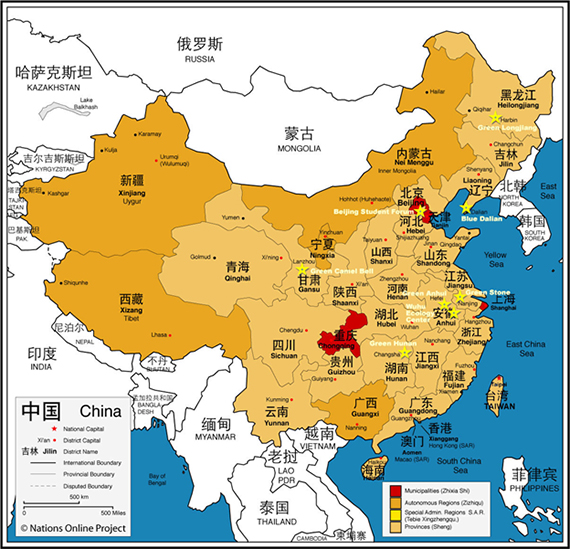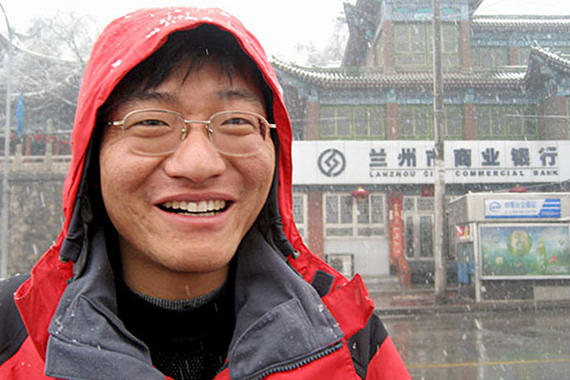"There is a crack in everything. That's how the light gets in." — Leonard Cohen
As a young boy growing up in Hefei in Anhui province in Southeast China, Zhao Zhong led an unassuming and bookish life indoors. From time to time, however, his grandmother took him away from his books and into the countryside, where he ran barefoot in the fields, and experienced the exhilarating open spaces of nature.
Zhao was hooked on the outdoors. As a student of electrical information and engineering at Hefei University of Technology in Anhui from 2000 to 2004, Zhao founded the university's "Outdoor Association." When it came time to graduate in 2004 and find a job, he focused his applications in Western China, excited by the chance to see its impressive mountains. Zhao landed a position at the Chinese Academy of Sciences in Lanzhou, the capital city of Gansu Province, where he conducted electronics and nuclear research as part of a physics institute. He was in a good place, both geographically and psychologically. By day, he had challenging and stable work with a respected organization. And in his spare time, he climbed mountains in Tibet, Gansu, and Qinghai, many of them with summits above 5,000 meters.
In late 2004, Zhao also founded Green Camel Bell (GCB), the first environmental NGO in Gansu province. If the mountains in Western China were largely unspoiled, the same could not be said of heavily polluted Lanzhou, called by another environmentalist as "the most polluted city on earth." GCB began modestly and tentatively, with a handful of volunteers and some informational activities about environmental protection. A few years later, however, something happened that would decisively change Zhao's life and career.

Industrial pollution in Baiyin, Gansu Province, 2007. Credit: Green Camel Bell.
A Crack in Everything
It was April 30, 2007, and Zhao and a friend were climbing the Sundankansan Mountain in Tibet. They had already reached about 5,800 meters—not far from the summit of 6,590 meters. The snow absorbed them past their knees as they walked.

Sundakansan climb on April 30, 2007: picture of Zhao Zhong's climbing partner. Credit: Zhao Zhong
Zhao could see a fissure that had opened in the ice, and tried to jump to the other side. But the gap was bigger than he had anticipated, and he fell through, dropping a terrifying 25 meters into the thin air. Supported by a rope tying him to his partner, he was suspended in the air, but his partner was unable to pull him back up. He was surrounded by ice. Over several hours, he lowered himself until he reached a small ridge on an ice cliff that was just wide enough for him to stand. His partner said he would run back to get help—but Zhao knew this would be a long descent of many hours back to the nearest village.
While he waited for his partner to return, he snacked on nuts, chocolate, and sugar, and chewed on snow and ice for water. In the first few hours, he tried in vain to hoist himself back up. Then followed many hours with nothing to do but think. When evening came, he stayed awake, worried that if he slept, he might not wake again. In the final hours before he was rescued, it was the "hardest time:" he was cold, with little food left, and his toes had almost lost their feeling. And he was worried that he would not be found again. When his friend at last returned with five others to rescue him, Zhao had been trapped in the ice for 33 hours. "October 1 is my birthday," recalls Zhao. "But ever since I was rescued—on May 1, 2007—I have two birthdays now."

Rescue team on May 1, 2007. Credit: Li Qiang
In the months following, Zhao reflected on his life and priorities. He told friends and family that he wanted to leave his stable job to work for GCB full-time. They advised against it. Undeterred, he began fundraising, and eventually raised enough money from Global Greengrants Fund and Pacific Environment to cover his salary and some office support. "My parents were proud when I worked for the Academy of Sciences," he says, "and they didn't understand my decision to leave it for full-time NGO work." But Zhao had made up his mind. He was ready to try to build GCB into a more impactful environmental organization.
Early Advocacy in Gansu
Even before his mountain accident, Zhao had recruited someone else to work for GCB. They had together started looking at water issues thanks to a 2006 project grant from Pacific Environment, but at first, he admits, they were "not sure what to do." In August 2006, Zhao and others attended a talk in Gansu by Ma Jun (his story is profiled here). Ma Jun had not yet established what would later become China's leading environmental NGO, the Institute for Public and Environmental Affairs (IPE), but he talked to them about information disclosure, and how people have a right to know about pollution violations. And Ma already had the idea of creating a national water pollution map.
Green Camel became the local partner in Gansu to support this national vision. They started doing field investigations, looking for pipes that would reveal evidence of illegal discharge. They collected pollution information from the Internet, went to factories to obtain their GPS locations, looked for wastewater nearby, collected samples to test in labs, and sent the findings back to Ma Jun in Beijing.
They also became the first NGO in Gansu, a remote corner of China, to engage with polluting companies, as well as with people who had been impacted by their pollution. In one notable case, the story broke on CCTV (Chinese national television) that Carlsberg, the beer company, had been caught discharging polluted water directly into a river in Tianshui, Gansu. Technically it was Carlsberg's local joint venture subsidiary that had been caught, but Carlsberg, as the foreign company, got most of the bad press. Carlsberg contacted IPE, and IPE said that if it wanted to update the information on the water pollution map, GCB would need to act as a local third party and conduct an audit. Carlsberg moved quickly and completed a wastewater treatment plant within days of the television report. Zhao and others were invited to confirm the new system was in place.
In another case, a local medicine company with a history of pollution had disclosed that it was planning to go public on the Shenzhen Stock Exchange. GCB wrote a letter to the Gansu Environmental Protection Agency (EPA) saying that it wanted more information about their pollution record and environmental management. The EPA set up a meeting involving the company and GCB (the EPA forwarded GCB's request to the company, and the managers of the company visited GCB's office). The discussion was frank and sometimes uncomfortable, with the company admitting that it had exceeded discharge limits. Zhao says the point of their letter was not so much to focus on this company (there were plenty of other offenders), but rather to send a signal to stakeholders in Gansu that an NGO can help provide oversight.
Community Environmental Management: It Takes a Village
Even so, advocacy for a small group like GCB, in an isolated corner of China like Gansu, was a delicate matter. They had to be careful. For one thing, local factories "paid a lot of taxes." Also, the government can "lose face" if an NGO uncovers something that the public feels the government itself should have prevented or detected. Lastly, GCB had received funding from overseas—which raised concerns especially in the west of China, with its minority populations and political sensitivities. Zhao knew that if they pushed too hard in their advocacy, they risked being shut down altogether. Zhao began thinking about the role of "community environmental management" as another way of promoting environmental protection. Working together with communities had some advantages. In advocacy, the NGO comes across as a "trouble maker." In contrast, capacity-building efforts position the NGO as helping the government to achieve its own goals. If results go well, the local government can even take the credit.
The disastrous earthquake of May 2008, with its epicenter in Sichuan province at 8.0 on the Richter scale, also led to profound damage in some villages in Gansu province to the north. While relief efforts focused on Sichuan, many hard hit Gansu villages had "very limited outside support." Zhao and his team decided to focus their efforts on helping one poor, remote village in Gansu called Chayuan (茶园; the name means tea garden village).
Chayuan had about 500 registered people, with 200-300 permanent residents. Four residents died in the earthquake, and many buildings were demolished. GCB encouraged reconstruction with an environmental dimension. They built comfortable, stable new homes with green materials. They introduced an "ecological toilet" that separated dry from wet waste and that avoided direct discharge to the local river. And they helped fund and establish an "ecological tea cooperative" with organic crops. They also helped build a local primary school, using locally sourced wood and a stable design. While other villages had arranged for construction firms to rebuild their schools, Zhao and his colleagues worked with the villagers to rebuild the school themselves—a process that made everyone proud and helped rebuild local morale.
From Projects to Programs
Zhao's ideas around environmental impact continued to evolve. Information disclosure, advocacy, collaborative approaches with communities—all of these, he came to realize, had their pros and cons. The Chayuan community project had been rewarding, but it had also required three years of intensive effort in just one small village. Meanwhile, China's environmental problems were multiplying and intensifying, and the country needed more people and organizations across all aspects of its green movement.
In September 2011, Zhao went to the United States to meet with a variety of organizations and consider other options for how he could contribute. He decided to join Pacific Environment (PE), which focuses on "strengthening local communities and grassroots movements, complemented with sophisticated policy advocacy." In September 2012, Zhao became PE's China program coordinator. The role enables him to mentor people and projects not just in Gansu, but all over China. PE had been an early sponsor of GCB, and it had helped Zhao to build his own understanding and skills. It was time for Zhao to pass along what he had learned—and on a larger scale.
Zhao's role at PE is multifaceted: he administers their grants program, delivers training and mentorship to grassroots partners, and supports communication and research issues. The organization is now working with eight partner organizations and a learning network from all corners of China, from Harbin to Changsha to Gansu to Jiangsu. Some groups are just getting started, while others are well established.

Map of Pacific Environments Projects in China. Credit: Pacific Environment
The training Zhao provides is bottom-up, and tailored to each organization's requirements and aspirations. For example, Zhao has worked with an organization called Wuhu Ecology Center (WEC), comprised of young university graduates, to help them build a relationship with the local government, obtain official NGO status, and build a strategic plan. Since environmental work is still a relatively new field in China, says Zhao, "deep mentoring" is important to help new organizations build skills and gain experience.
A Different Timeline
In October 2009, while still with GCB in Lanzhou, Time Magazine caught Zhao by surprise and named him a Hero of the Environment. It was a "very accidental award," he says modestly; "I was lucky." Time was hoping to recognize an effort "at the grassroots level," and they chose him, highlighting his role in the Carlsberg story. The Chinese media followed Time with its own coverage, branding Zhao as an "ecological hero." "My parents," he says with a smile, felt "proud again."
Looking back on the award from his mentoring role today, Zhao sees it as a responsibility. He shares his "story as a way to motivate others," and to show people that they can find ways of being "successful" in the nonprofit world, despite making less money than some other paths. Yet he knows this path is not for everyone. Zhao admits: "If I were a government official or company manager, I might make the same short-term decisions they do." But China needs to balance the environment and economy, he says, "and this is a long-term project." Even the optimistic scenario for China's environment, he reckons, will take a very long time: in another decade, perhaps the majority of Chinese will "realize the importance of environmental protection;" and in another 20 or 30 years, "public participation" may help resolve "conflicts between the environment and development."
Zhao's sense of mission—his passion for improving China's environment—is a paradoxical response to his survival experience. After nature, in its cold indifference, almost took his life, he decided to dedicate his career to the environment. After finding himself in a crisis where every hour was critical, he now defines success by the decades. Indeed, Zhao acknowledges the possibility that the fruits of his efforts, and those of his contemporaries, may only be fully enjoyed by future generations: "You are doing something, and perhaps you can't see or touch the results or achieve the mission before dying." And what is that destination? "A protected environment," he answers, "with blue sky, green mountains, and humans and nature in harmony."

Zhao Zhong. Credit: Christina Larson




